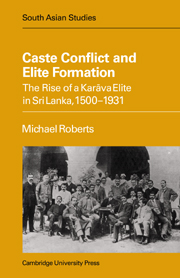Book contents
- Frontmatter
- Contents
- List of figures, chart and maps
- List of tables
- Preface
- Glossary
- List of abbreviations
- Map 1 The Kingdoms of Kotte and Kandy
- Map 2 Some physical features and place names
- Map 3 Present administrative divisions and the contemporary migration patterns of fishermen
- Map 4 The coastal waters of Sri Lanka and southeastern India
- 1 Introduction
- 2 The Karāva in the past
- 3 Caste among the Sinhalese
- 4 Economic opportunities and social relations, 1500s–1790s
- 5 The British period: the economic advances of a Karāva elite
- 6 Social competition, caste conflict and manifestations of Karāva power
- 7 Casteism in South Asian politics during British times: emergent cultural typifications or elite fictions?
- 8 Causal factors in the moulding of Karāva entrepreneurship and the emergence of a Karāva elite
- 9 Concluding remarks
- Tables
- Appendix 1 Problems and cautionary notes concerning the information derived from the plantation directories in the sequential series known as Ferguson's Ceylon Directory
- Appendix 2 A contemporary newspaper account of the reception provided for a Karāva notable on his receiving the title of ‘Mudaliyar of the Governor's Gate’ in 1853
- Appendix 3 A list of caste pamphlets and caste literature in chronological order, 1864–1930
- Select bibliography
- Index
7 - Casteism in South Asian politics during British times: emergent cultural typifications or elite fictions?
Published online by Cambridge University Press: 30 October 2009
- Frontmatter
- Contents
- List of figures, chart and maps
- List of tables
- Preface
- Glossary
- List of abbreviations
- Map 1 The Kingdoms of Kotte and Kandy
- Map 2 Some physical features and place names
- Map 3 Present administrative divisions and the contemporary migration patterns of fishermen
- Map 4 The coastal waters of Sri Lanka and southeastern India
- 1 Introduction
- 2 The Karāva in the past
- 3 Caste among the Sinhalese
- 4 Economic opportunities and social relations, 1500s–1790s
- 5 The British period: the economic advances of a Karāva elite
- 6 Social competition, caste conflict and manifestations of Karāva power
- 7 Casteism in South Asian politics during British times: emergent cultural typifications or elite fictions?
- 8 Causal factors in the moulding of Karāva entrepreneurship and the emergence of a Karāva elite
- 9 Concluding remarks
- Tables
- Appendix 1 Problems and cautionary notes concerning the information derived from the plantation directories in the sequential series known as Ferguson's Ceylon Directory
- Appendix 2 A contemporary newspaper account of the reception provided for a Karāva notable on his receiving the title of ‘Mudaliyar of the Governor's Gate’ in 1853
- Appendix 3 A list of caste pamphlets and caste literature in chronological order, 1864–1930
- Select bibliography
- Index
Summary
The story of the Karāva elite and their social and political operations is hardly an isolated case. In India as well changes in the distribution of economic and political power resulted in the emergence of elites among castes that were traditionally placed low in the ritual hierarchy. These men, too, were confronted by the dilemma of status inconsistency. In many instances they attempted to resolve this problem by championing the cause of their ‘caste’ and by adopting prestigious status symbols and pursuing those strategies which scholars have described as ‘Sanskritisation’ and ‘Westernisation’. In many cases, they created a new organisational form to pursue these interests: a voluntary association which restricted membership to their ‘caste’. These are known in the literature as ‘caste associations’.
Among such cases, two which have received much attention are those of the Iravas (or Izhavas) of Travancore and the Nadars of the Madras Presidency and southern Travancore. These case-studies are noticed briefly in this chapter, not only because they provide interesting parallels with the Karāva case but also because they can be used as a point of entry to what is the central concern of this chapter: namely the nature of the links between elite and mass within such mobilised ‘caste formations’, and the nature of caste consciousness and communal solidarity within such formations both in pre-British and British times. Such a concern is directed towards a formulation of an answer to the question whether caste consciousness can be regarded as a primordial yet flexible identity with the ability to reproduce itself and perpetuate its relevance in radically changed contexts.
- Type
- Chapter
- Information
- Caste Conflict Elite Formation , pp. 180 - 224Publisher: Cambridge University PressPrint publication year: 1982



